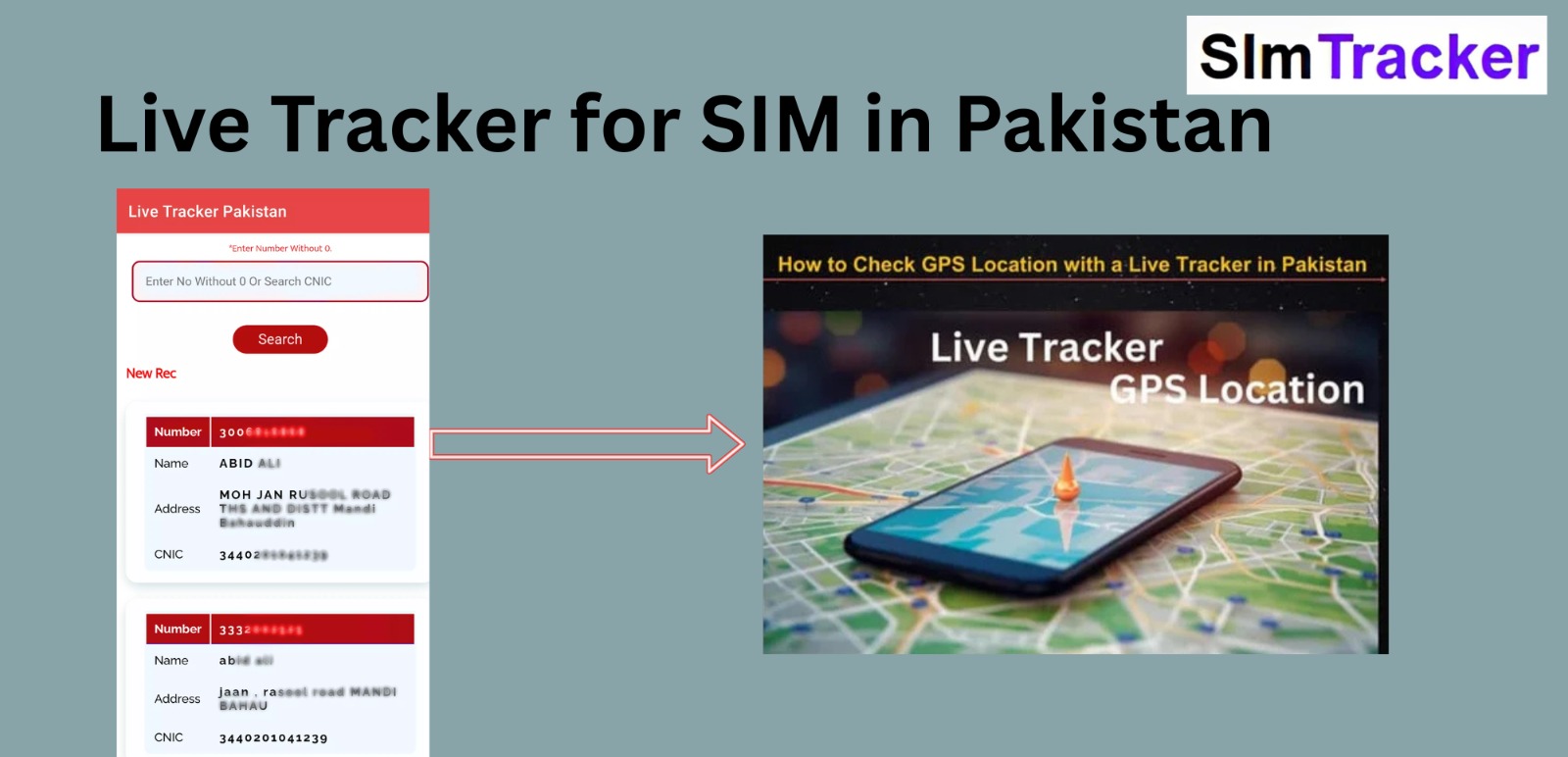Live SIM Tracker in Pakistan: Legal or Illegal Use?

With mobile connectivity shaping every corner of our lives, the demand for tools like live tracker for SIM in Pakistan has surged. Whether it’s for locating family members, safeguarding elderly parents, or addressing corporate misuse, SIM tracking is increasingly sought after. But with rising interest comes a pressing legal question: Is SIM tracking legal in Pakistan? Understanding the difference between legitimate tracking and unlawful surveillance is more important than ever.
In this guide, we’ll explore the legal framework, authorized uses, and risks associated with SIM tracking. Plus, we’ll show how to check SIM owner details or use a live SIM tracker the right way—without crossing legal boundaries.
What are SIM Live Tracking and How Does It Work?
SIM live tracking refers to the process of locating a mobile number in real time using network-based triangulation or GPS data. Telecom networks can trace a SIM's activity via towers and linked CNIC data, helping identify where a phone is currently located.
When someone tries to track a SIM, they typically input a mobile number or associated CNIC into a tool or system. The network then fetches the SIM’s last known location or live usage status by identifying the nearest mobile towers or signal path. This process, however, requires authorized access, especially under the CNIC tracking law, which governs how such personal data is handled in Pakistan.
To better understand this, you can explore how SIM tracking works through verified platforms.
Pakistan’s Legal Framework around SIM Tracking
So, what's the SIM tracking legal status Pakistan recognizes?
SIM tracking in Pakistan is governed by multiple regulatory bodies and legal frameworks, including the Pakistan Telecommunication Authority (PTA) and the Prevention of Electronic Crimes Act (PECA). The PTA requires all SIMs to be registered through biometric CNIC verification, linking every mobile number to a legal identity. However, this doesn't mean the data is free for public tracking.
According to PTA SIM policy, only law enforcement agencies (LEAs) are permitted to access live SIM data under court orders or national security grounds. Private individuals, businesses, or apps attempting to offer SIM tracking without legal clearance are acting unlawfully.
Under the mobile surveillance law Pakistan, unauthorized surveillance is a violation of both cybercrime law and fundamental privacy rights. Is SIM tracking legal then? Only when performed by government authorities under documented legal requests.
You can explore SIM owner verification tools or review the PTA SIM guidelines to stay within legal limits.
Real-World Use Cases – When SIM Tracking Is Used Legally
There are clear and lawful circumstances where the live tracker for SIM in Pakistan is applied.
Missing Persons
Law enforcement may track a person’s mobile number to help locate them, especially in child abduction or missing person cases.
Corporate Misuse
Organizations may request SIM tracking to monitor or disable company-issued SIMs being misused by employees—though only after proper legal documentation.
Family Safety
With proper authorization, families sometimes track elderly members or children using legally obtained apps or telecom services.
Criminal Investigations
LEAs use mobile surveillance as a crucial part of criminal investigations. These processes are backed by FIRs or court-approved orders.
So, is SIM tracking legal? Yes—but only under these structured conditions. You can explore SIM tracking for safety or learn how to track SIM with CNIC through authorized means.
Risks of Unauthorized SIM Tracking
Despite legal options, many try to access mobile location data through backdoor methods or shady tools—an action that can land them in serious legal trouble.
Privacy Violation
Tracking someone’s SIM without consent breaches their right to privacy, especially if done without legal justification.
Criminal Offense
Under PECA, unauthorized SIM tracking is punishable by fines and imprisonment. It’s not just unethical—it’s criminal.
Misuse of Data
Sensitive SIM data in the wrong hands can lead to scams, impersonation, or blackmail. These actions fall under data misuse Pakistan clauses.
Legal Repercussions
Anyone found guilty of tracking a mobile number without legal grounds can face arrest, trial, and penalties under cybercrime laws.
To avoid SIM fraud or protect your identity, always verify SIMs and use a CNIC details checker to stay aware.
Ethical Alternatives to Live Tracking
Rather than risk illegal actions, consider these ethical and legal ways to get SIM information:
- Use official channels: Contact the telecom provider or PTA with valid concerns and identification.
- Use trusted tools: Services like SimOwners.info offer secure and lawful SIM owner detail lookups.
- IMEI-based tracking: Another legal route is tracking your device via the IMEI tracker Pakistan if the phone is lost or stolen.
These ethical SIM tracking practices keep you compliant with laws while providing needed insights. You can even do a full SIM record check via authorized platforms.
What to Do If Someone Is Tracking You Without Consent
Worried someone might be spying on your SIM? Here are the signs and what steps you should take.
- Red Flags
- Sudden battery drain or overheating
- Unusual background apps or data usage
- Strange behavior in call logs or messages
- Report Immediately
If you detect signs, report it to:
- PTA complaint center
- Cyber Crime Wing (FIA)
- Your mobile network provider
Also, make sure your IMEI is registered and your SIM is secured under your CNIC. This reduces vulnerability and aids in investigating any cybercrime tracking.
To protect your mobile data or get CNIC information for a suspicious number, use secure, legal platforms.
Conclusion
To sum up, using a live tracker for SIM in Pakistan can be helpful—but only when done legally. The country's telecom regulations and cybercrime laws clearly state that unauthorized SIM tracking is illegal and punishable. The answer to is SIM tracking legal depends entirely on context: it's legal when conducted by LEAs with proper documentation, and illegal when done for private reasons without consent.
If you're looking to find secure, lawful ways to check mobile number ownership or location info, platforms like SimOwners.info offer trusted, verified services.